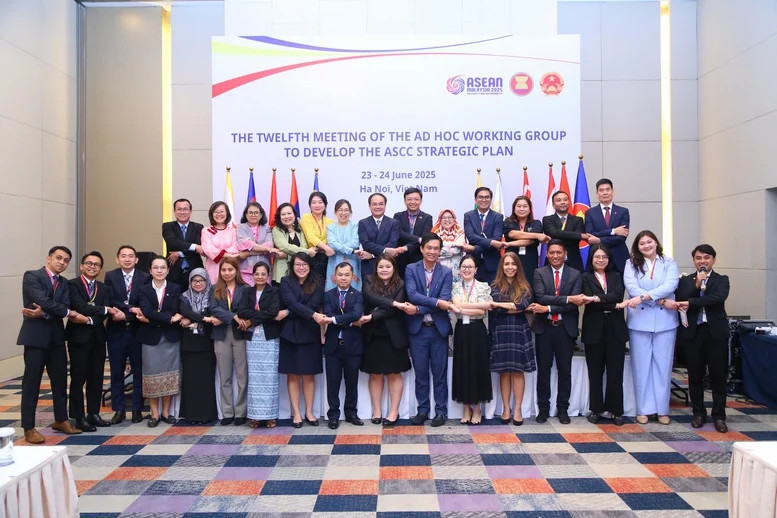On June 23 and 24, Vietnam’s Ministry of Home Affairs hosted the 12th Meeting of the Working Group on the ASEAN Socio-Cultural Community (ASCC) Strategic Plan in Hanoi, marking a significant step in regional cooperation efforts and aligning national development goals with ASEAN’s 2045 vision.
Key ASEAN meeting brings regional cooperation into focus

The meeting was co-chaired by Malaysia and the Philippines-serving as Chair and Vice Chair of the ASCC Working Group during ASEAN 2025-with participation from representatives of all ten ASEAN member states, the ASEAN Secretariat, and Timor-Leste as an observer. The Vietnamese delegation was led by Ha Thi Minh Duc, Deputy Director General of the Department of International Cooperation under the Ministry of Home Affairs.
In his opening remarks, Deputy Minister of Home Affairs Vu Chien Thang emphasized the significance of the Kuala Lumpur Declaration on “ASEAN 2045: Our Shared Future” and the ASEAN Community Vision 2045, both endorsed by ASEAN leaders in May 2025. He highlighted the declaration as a milestone recognizing the Working Group’s efforts to draft the ASCC Strategic Plan. “As the lead agency for ASCC in Vietnam, the Ministry of Home Affairs is committed to actively supporting and implementing the strategy to contribute to sustainable regional development,” he said.
Deputy Minister Thang also shared updates on Vietnam’s sweeping administrative reforms. Effective July 1, 2025, a new two-tier local government model will be launched, merging provinces and cities to reduce the number from 63 to 34 and abolishing district-level administration. The reform aims to streamline governance and prioritize citizens. “Despite the workload, the Ministry and the entire political system are working to meet the timeline. With public support, we believe this administrative revolution will succeed and benefit both citizens and businesses,” he stressed.
Alongside domestic reforms, Vietnam has begun developing a new project to implement the ASCC Strategic Plan and is conducting a final assessment of the ASCC 2025 Master Plan-an initiative assigned by the Prime Minister following the 46th ASEAN Summit. This reflects Vietnam’s determination to contribute to ASEAN’s shared goals.
Strategic focus and results-oriented dialogue
During the 12th Meeting, delegates discussed several key areas. Communication strategies to promote the ASCC Strategic Plan were emphasized to raise public awareness of the vision and goals. Proposals to improve monitoring and evaluation processes were made, referencing the ASCC 2025 Master Plan Monitoring and Evaluation Guidelines.
A core focus was on mapping the monitoring systems of ASCC sectoral bodies and outlining a roadmap for the post-2025 ASCC Results Framework, particularly the performance indicators (KPIs) proposed by these bodies.
The KPI set is considered a vital tool to track progress and outcomes of the Strategic Plan’s implementation. Delegates also exchanged lessons learned from ASCC 2025 monitoring efforts to ensure continuity and feasibility for future planning. The discussions demonstrated the close cooperation and strategic orientation shared by ASEAN member states.
Vietnam’s proactive leadership earns regional praise
As host country, Vietnam showcased responsibility and creativity in guiding discussions. Its administrative reforms, focus on good governance, and promotion of citizen participation were clear indicators of its commitment to integrating regional goals into national strategies.
Co-chairs Dr. Christina Yeo Ken Yin (Ministry of Tourism, Arts and Culture, Malaysia) and Mr. Mike Mohen A. Padilla (Department of Social Welfare and Development, Philippines) praised the thorough preparations and professional organization by Vietnam’s Ministry of Home Affairs. They also acknowledged support from the Australian initiative “Partnerships for ASEAN’s Future” in enhancing regional cooperation efforts.
The 12th Meeting of the ASCC Working Group was not only a platform for dialogue but also an affirmation of ASEAN countries’ collective commitment to building a resilient, dynamic, creative, and people-centered community. The ASCC Strategic Plan is expected to significantly shape the region’s development journey toward ASEAN Vision 2045.
With its active and responsible role, Vietnam continues to assert itself as a key member contributing to ASEAN’s shared prosperity. The Hanoi meeting exemplified Vietnam’s spirit of collaboration and resolve in building a united, sustainable, and forward-looking ASEAN community.
Thanh Hue